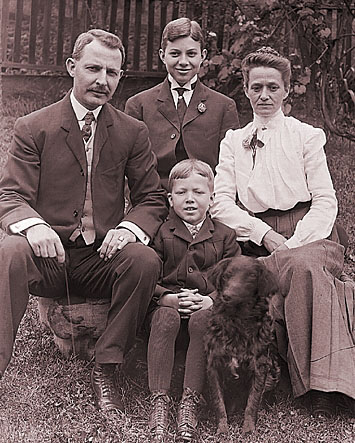
ca. 1904
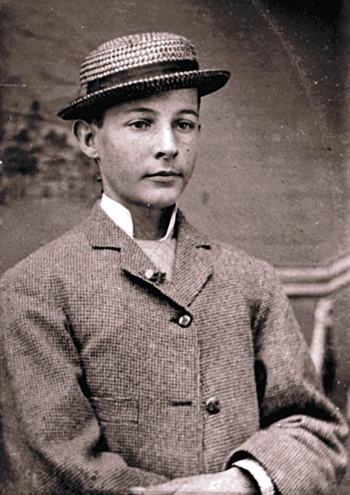
1881, Age 17
Telegrapher & Ticket Agent
Panhandle Railroad
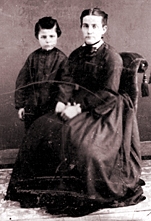
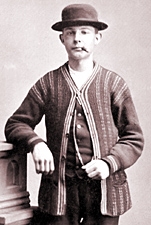
& his mother
ca. 1868, age 4
1881, age 17
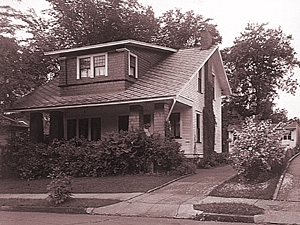
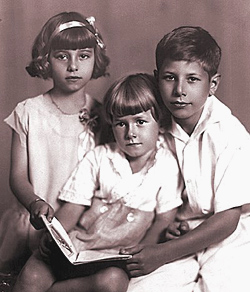
ca. 1930

|
||
|
George Elmer Fisher family portrait ca. 1904 |
||

|
||
|
George Elmer Fisher 1881, Age 17 Telegrapher & Ticket Agent Panhandle Railroad |
||

|

|
|
|
George Elmer Fisher & his mother ca. 1868, age 4 |
George Elmer Fisher 1881, age 17 |
|

|
||
| 631 West Earle Ave. | ||

|
||
|
Margaret, Bob, & Jim Fisher ca. 1930 |
||
E4 George Elmer Fisher, born October 1, 1864 in Uhrichville, Ohio, died February 11, 1953 in Youngstown, Ohio (![]() ); married February 21, 1885 Anna Martha Goff in Muskingum County, Ohio. Anna Martha was born March 24, 1864 in Frazeysburg, Ohio, and died June October 23, 1951 in Youngstown, Ohio (
); married February 21, 1885 Anna Martha Goff in Muskingum County, Ohio. Anna Martha was born March 24, 1864 in Frazeysburg, Ohio, and died June October 23, 1951 in Youngstown, Ohio (![]()
![]() ). Both are buried in Forest Lawn Cemetery, Boardman, Ohio. Two children.
). Both are buried in Forest Lawn Cemetery, Boardman, Ohio. Two children.
- James Lee Fisher, 1977
an excerpt from This One Is On Me!
Baltimore and Ohio Railroad CompanyMarch 12, 1886
11 k Pm
For Saturday March 13
Dearest Anna This is to represent a Welcome Note. It may not be very floury in Composition not Eloquent in address but it Will in a Measure express my happy feelings When I know that you are at home. To say that you are Welcome is putting it very mildly. In fact I do not know of any word or words that would express by half my graditude at your return. What you see in this & other rooms was purchased by me for your comfort. These and the painstaking arrangements show to a degree My appreciation of your true Value and worth. I will almost pray for the part of my life that intervenes(?) between the hours of 3K and 7K Pm to pass away quickly that I may get home & pour all My love in one embrace. As everything is new to you I will give you some instructions in regard to the position of things. Firstly the bank is in the baker in the kitchen closet. Count the money when you take it out. Open it by raising roof at the back. Fire in the kitchen stove is all ready to light. Cooking water in bucket boiler on Oil stove. Soft water in tub. I will now put in the time as best I can until tomorrow night. GeoThis letter was my welcome back home after my first baby was born. He had moved into rooms with Spencers and bought some new furniture and fixed all up nice and my bed was ready. I was weak and heart broken on the loss of our little son and sat and cried after I read this. Mrs Spencer thought me ungrateful but my mother who came with me, understood me better. I was deeply in love with the young husband who wrote this and you can see he cared too.
- Written May 15, 1936 by Anna Martha Goff FisherOn outside of envelope: Contents of this envelope valuable to me. I want my sons to read it after I am gone.
(written by Anna Martha to Geo & James Fisher some time in the early 50ís. It relates to May 1936 & Mar. 1886.)
March 16, 1994 Dear Liz: I should acquaint you a little better with my Grandpa, George Elmer Fisher. He was a very likeable guy, with a lot of good humor in him.He was born, as you know, in Adams Mills, Ohio, near Newark, Ohio, on October 1, 1864, This was near the end of the Civil War, and Abraham Lincoln was president. Life was simple, if you call having no plumbing, no running water, having to chop wood to do any cooking, simple. He never told me much of his childhood, but somewhere he learned to read and write and he had beautiful handwriting. My mother told me that Grandma taught him most of all this, including arithmetic. (Grandma was Anna Martha Goff Fisher) He had good looks and was very popular with the ladies, which kept Grandma in a constant state of anxiety and frustration. He was a dandy with nice clothes and a black moustache, and he loved music. He taught himself to play the violin, the banjo, the trumpet and even picked out some simple hymns on the piano.
Grandpa had pet names for everybody. When my brother Jim was born, Grandpa named him the "Old Timer", a railroad expression for an old man or and old character, or an old train. Later, the name was modified to "Old Ti-eemer". When Margaret came along, Grandpa named her "Maggie O'Vitch-Vatch". I never did find out the origin of that name. When I was born, on June the fourteenth, 1924, he called me "Robert Ross Fisher", the one hundred percenter, born on Flag Day. Our dog, Sport, a nervous little fox terrier, never made up to Grandpa. Gramp's name for him was "Spin-nort". When we were away in summer camp, he used to send us cards or letters full of funny stuff that never failed to cheer us up. Grampa had a lot of funny little, quotes and verses that he would pull on us. If we stayed at their house overnight, first Grandma would come upstairs and hug us and God-bless us, then, after things got quiet, we would hear Grandpa on the squeaky stairs, coming up slowly while he would say, in a quiet voice, "I kin lick anybody in the shouse-house". Margaret would squeal with delight, and I would giggle. Then he would come creeping into the room and again "I kin lick enny-body in the shouse-house." We would always ask him "Grandpa, what's a shouse-house?" And he would just say "Heh, heh, heh !" Margaret would later call that Grandpa's "dirty laugh". He had a little verse about a frog, that he used to recite:What a queer bird the frog are,There might be a second verse to this, you'll have to ask Uncle Jim.
When he sit, he stand, almost.
When he hop, he fly, almost
He He ain't got no tail hardly.
He sit on what he ain't got.
Click here to hear the Frog Round.By the time I was born, my grandparents lived at 631 West Earle Ave., now a killing area! which was only a few blocks from where we lived at 643 West Warren Ave., in Youngstown, Ohio. So we could go up to Grandma's house without much trouble. However, Jim was the only one who was allowed to go up there by himself.
One day, Jim went up to see Grandpa (I say "up" because it was on higher ground than our house) and Grampa decided to let Jim shoot one of the old .22 gauge rifles that he had. There were two of them, and I think that they originally belonged to my Dad and Uncle George, Dad's brother. So they went into the garage, which had a black cinder floor, and Gramp set up a target for Jim to shoot at. I suspect that he chose the garage so that Grandma would not see what they were up to. I think Jim was about ten or eleven at the time. Well, Jim let the end of the gun barrel touch the floor, and it got some mud on the end of the rifle barrel, so he reached up to wipe off the mud while pulling the rifle back with his right hand, and, of course, he shot a bullet through the thumb web of his left hand. Luckily, it didn't do much damage, and healed up nicely, but Grandma probably raised all kinds of hell.
Grandpa didn't learn, though, because sometime later he took me up to the "sleeping porch" (a room added over the front porch) and let me shoot the rifle at one of the walls. Later I discovered that this wrecked the plaster on the inside of the closet which was behind the wall I was shooting at. Grandma never called this little cramped closet a "closet". To her it was always a "cubby hole". It was squeezed in under the eaves, and didn't hold much.
Grandpa had another problem that showed up from time to time. I remember one time when I was searching around among his paint cans, I came up with a pint of booze. I think it might have been brandy, but I really don't remember. Anyway he warned me not to tell the "old girl" about my find. He always referred to Grandma as the "Old Girl". When he talked to her directly, he called her "Sissy" I think this was what her family called her because she was the oldest sister.
When Dad was an intern at the Youngstown Hospital, In 1918, he told me that he would sometimes get a frantic call from his mother, telling him that his father was "terribly sick" and he would rush out to their house only to find that his father was staggering drunk. Dad would get him upstairs into bed so he could sleep it off. I think Grandma wanted to have Dad see him in this condition so that Dad would scold him. I think Dad would rather have joined him. Dad said that Grandpa used to walk down to a bar in Fosterville where he was a very popular story-teller. The guys would buy him drinks and he would entertain them with stories of his railroad days, or his experiences in the "bucket shop". Then he would stagger on home and Grandma would have a fit!
Gramps was quite a gardener. He had a beautiful row of Peonys along his driveway against the house, and flowers on the other side of the driveway as well, He planted two buckeye trees in the devil strip by the curb. He also had a vegetable garden in the back yard. He made little wooden signs mounted on long wires which he put into the ground to identify his flowers. One day he made a sign for his next door neighbor's garden that said "This ground is no good- it has worms in it". Grandpa smoked a pipe with Prince Albert in it. He found that life was simpler if he stayed in the basement, so he spent most of his time either in the basement or outside. That way he stayed out of range of "the old girl". The house always smelled of his pipe smoke. He had his typewriter down there, and that's where he did his cross-word puzzles and where he worked on his cross-word dictionary. Grandma spent her time upstairs cleaning, praying and thinking. Grandpa used to say that she "wore the carpet out sweeping it". They had sort of an armed truce, but with frequent border clashes. But after she died, he was lost. He used to sing "Dear Old Girl" with tears in his eyes while Dad accompanied him on the piano. Going to Grandpa's house was always a great experience. The first thing you noticed when you came in the back door was the pipe smoke smell. The back door opened onto a small landing that was about five steps down from the kitchen, on the way to the basement. So you first looked into the basement to see if Grandpa was down there, which he usually was. Up into the kitchen, Grandma would usually be standing at the sink gazing out the window, watching the birds. When she saw us coming up the steps, she would break out into a big smile and say"Welllllll ! How nice to see you". We always got a big hug, then ran into the living room to see what kind of hard candy she had in the fancy fostoria jar on the big oak table in the front window. The living room was full of overstuffed furniture, with crocheyed doilies an the arms. Grandpa's chair had a floor lamp with fringe all around the edge of the shade. There was an upright piano in the back of the room along the staircase, which we loved to try to play. Inside the clothes closet were more interesting things. A violin, a cornet, a banjo are the things I remember, but there may have been more.. We tried out all of them, no one said we couldn't. The stair way started with a landing in the far right corner of the back wall and ascended to the left up the stairs. It had a big wide oak bannister which we used to slide down on. At the head of the stairs was the bathroom, with a big white tub that stood on four feet. The bathroom had a gas-fired heater, a black stove that stood on the floor and had to be lit with a match. There were two bedrooms, one with a white iron bed and the other with a big oak., bed. It had a tall headboard with some carved scrollwork on it. At the foot of the bed was Grandpa's big oak roll top desk, and it had on it an ornate black lamp with a green glass shade. That lamp is now in our bedroom, and to me its like a member of the family. Then there was the "sleeping Porch" which I told you about. It apparently was added later over the front porch which extended across the entire front of the house. Grandma developed Cancer of the cervix (uterus) while Dad was in the Navy in World War II and I was in medical school, and my mother had to take her back and forth to the hospital five days a week for X-Ray treatments. I don't remember what year it was when she died, but we buried her on a day in October, and that evening there was a glorious sunset. That's when Jim made his famous remark, "Well, Heaven's under new management now!" Grandpa developed Parkinson's Disease and was brought out to live at 166 Mill Creek Drive with Dad and Mother. In his increasingly senile state, he started to become abusive of mother, so Dad had to put him in a nursing home down on Woodland Avenue. It was an old house, with men on the first floor and women on the second floor. One day, Dad got a call from the lady who ran the place that his father was molesting the ladies, and he would have to go.. When Dad questioned him, he said, "I was just helping her on with her stockings." He died in his sleep one night, painlessly, and we buried him beside "the old girl".
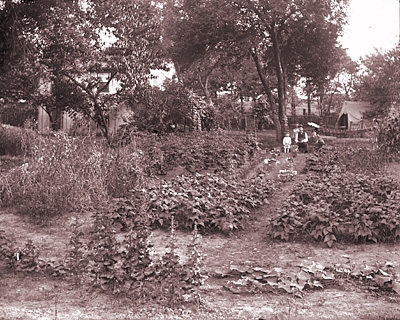
George Elmer Fisher's garden in Freeport, Pennsylvania
ca. 1905Love, Dad
(RRF 3/28/94)
The Vindicator
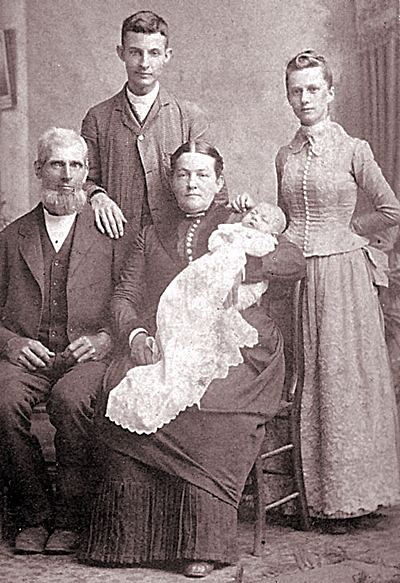
October 23, 1951
Youngstown, Ohio
Mrs. George E. Fisher Dies; Funeral Friday Mrs. Anna Martha Fisher, aged 87, of 631 W. Earle Ave., died of cancer at 3 p.m. Tuesday in North Side Hospital. Born March 24, 1864, at Frazeysburg, O., she was a daughter of James T. and Nancy Ellen Dunn Goff. She came to Youngstown in 1914 from New Castle, Pa. She was a member of Trinity Methodist Church and the Mrs. Fitzgerald Bible Class. Besides her husband, George E. Fisher, she leaves two sons, Dr. James L. of Youngstown and George R. of Cleveland; a brother, Frank Goff of Sunbury; five grandchildren, and six great-grandchildren. Funeral services will be helf at 1:30 p. m. Friday at the Shriver-Allison South Side Funeral Home, where friends may call Thursday evening.
Children of George Elmer Fisher and Anna Martha Goff:
Infant Male Fisher, stillborn, March 1886.
F1 George Ross Fisher, born March 15, 1887, died May 20, 1980 in Florida; married (1) ca. 1908 Pearl Maude Johnson; married (2) Mabel Weller. F2 James Lee Fisher, born August 14, 1895 in Carnegie, Pennsylvania, died December 24, 1987 in Mahoning County, Youngstown, Ohio. Married Margaret Ethel Zellman on March 15, 1919. Ethel was born May 6, 1897 in Philadelphia, Pennsylvania. Died January 2, 1981 in Youngstown, Mahoning County, Ohio. Both are buried in Forest Lawn Cemetery, Boardman, Ohio.
The George Fisher Family History is a compilation of information gathered by Eric & Liz Davis.
This HTML version was created by Eric and Elizabeth Fisher-Davis, beginning in 2001.
Tree Outline of Fisher Generations